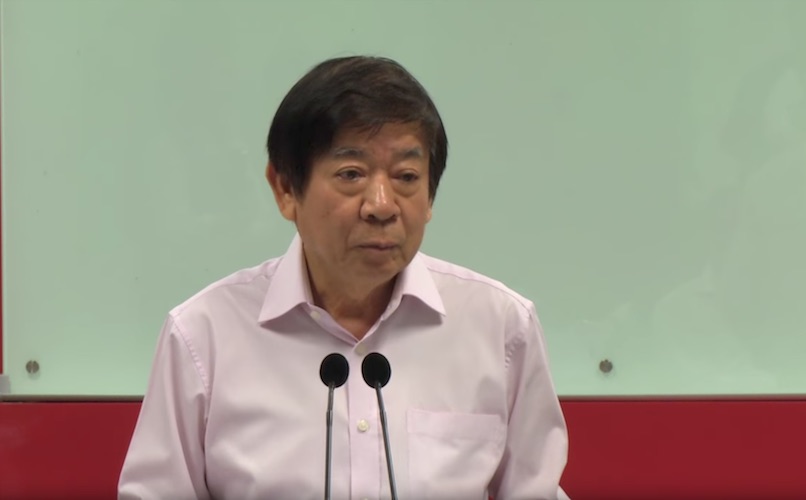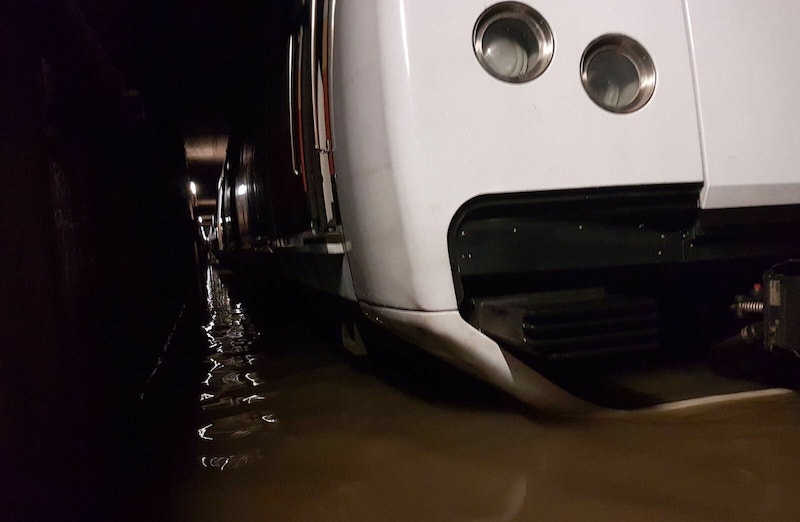SMRT’s head honchos have finally spoken out about one of the worst train service disruptions in the country (a tunnel was actually flooded), and surprise, surprise, they’re not deflecting the blame.
In fact, SMRT’s president and group chief executive officer Desmond Kuek took full responsibility for the 20-hour service disruption on the North-South Line (NSL) on Oct 7. Transport Minister Khaw Boon Wan didn’t find fault with media coverage this time, and blamed SMRT’s maintenance team for failing commuters.
Two weekends ago, about 250,000 commuters were left stranded on a stormy Saturday afternoon when train services ground to a halt on practically half the NSL. A portion of the train tunnel between Braddell and Bishan MRT stations were flooded due to the downpour, and a small fire occurred in the tunnel between Marina Bay and Raffles Place MRT stations shortly after. The incidents started around 5:33pm on Saturday, and it was only at 1:50pm the next day that all NSL services were fully restored.

Speaking at a press conference held yesterday with officials from the Land Transport Authority (LTA) and SMRT, Minister Khaw called the incident “preventable” and apologized that it happened.
“The SMRT team in charge of maintaining the anti-flood system at Bishan has failed us,” he said.
“Basically, MRT tunnels are designed to handle our weather, and can cope with very extreme storms, far more severe than what we experienced in the last two weeks… (The) bottomline is that MRT tunnels should not be flooded. Full stop.”
So what happened?
According to LTA, it was a combination of factors. First, the authority explained the systems in place that prevent tunnels from getting flooded:

- Large stormwater pits collect excess rainwater before they can flow into the tunnel entrances. The stormwater pit at Bishan has the capacity of about two Olympic-sized swimming pools and can contain about six hours of continuous heavy rain.
- The stormwater pits are equipped with multiple pumps that siphon water to an external drainage system. These pumps are controlled by a series of sensors (also known as float switches), which automatically turn the pumps on when water reaches specified levels. Should water rise to a critically high level, a separate “alarm” switch (“high water level” switch) would trigger an alarm at the Operations Control Centre (OCC). This would alert duty officers, who can then investigate the cause of the alarm and activate additional measures if necessary.
But as Khaw pointed out, the water reservoir “had not been maintained properly”. Even before the incident, the pumping system was found to be faulty, in addition to accumulated sludge and debris in the lower compartment of the water pit that could have impeded the operations of the pumping system. Thus, water accumulated in the pit and overflowed in the tunnels.
“It’s so simple that it should not have happened…It’s as embarrassing as that,” the transport minister stated.
SMRT has since initiated changes in the maintenance regime, with more rigorous checks on water pumps and flood sensors to be conducted on a monthly basis, instead of once every three months. Additional radar sensors will also be installed to activate pumps.
The SMRT maintenance team that failed to maintain the system at Bishan MRT station will have their bonuses cut, said SMRT chairman Seah Moon Ming. A senior executive in charge of the task has also been removed.
“Deep-seated cultural issues”

On Kuek’s side, he pinpointed the “deep-seated cultural issues” in SMRT that remains the root of all its problems. Admitting that many of SMRT’s major disruptions in the past can be attributed in some part to human error, he urged the public to remember that 90 percent of his employees are “incredibly committed, professional and commuter focused”.
“We are determined to get there and encouraged by the progress already made,” he noted at the end of his statement.
“But for the times that we have not been able to catch the falling balls in time, we are sorry for the inconvenience it has caused you, and resolve to learn the lessons and do better.”





Reader Interactions